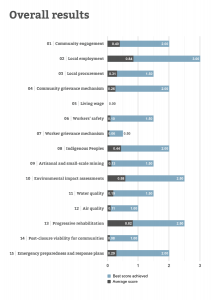A report issued by the Amsterdam-based Responsible Mining Foundation reveals that many Toronto-listed junior and mid-tier mining companies do not properly disclose environmental, social and governance information related to their mine sites in Australia, Burkina Faso, Canada, the Ivory Coast, Liberia, Mali, Mexico, Kyrgyz Republic, and Suriname.
The study assessed mine-site-level disclosure by 12 companies and their 31 mine sites located across nine countries and covered 15 key environmental, social and governance issues of public interest, known as ESG.
The average score when it comes to the disclosure of such issues was 11%, with only three of the 31 mine sites surpassing that mean with a score of 25%. “Where companies do publish site-level ESG information, the data is often presented in ways that reduce its usefulness to stakeholders. This includes, for example, environmental data shared without information on where and when pollution levels exceeded limit values,” said Pierre de Pasquale, lead researcher of the study, in a media statement.

According to Pasquale, stronger disclosure was seen in places where there is clear government regulation of reporting. “Similarly, sites that are subject to requests from shareholders or investors to align their practices with international initiatives and reporting standards, also tend to show stronger ESG data disclosure,” he said.
In the document, the Responsible Mining Foundation stated that one aspect that contributes to weak reporting is that, although they provide non-binding recommendations based on standard Canadian regulations, the Toronto Stock Exchange and TSX Venture Exchange do not have any requirements when it comes to ESG information disclosure by mining companies.
In terms of the specific issues where companies scored the lowest, the report says working conditions is the most worrying. The paper states that many of the companies scrutinized are not able to demonstrate that they ensure the provision of appropriate safety equipment for all workers, or that they have effective grievance mechanisms in place for their workforce.
The author of the report says that improving such conditions and reporting on the improvements are key to develop trust-based relationships and engage in constructive discussions with communities, workers, governments, shareholders, investors, and other stakeholders.
“Mining companies themselves stand to gain from strengthening their ability to ‘know and show’ how they are addressing these issues of public interest,” Hélène De Villiers-Piaget, CEO of the Responsible Mining Foundation, said in the media brief.
The post Many Toronto-listed miners don’t disclose environmental and social info — report appeared first on MINING.com.
